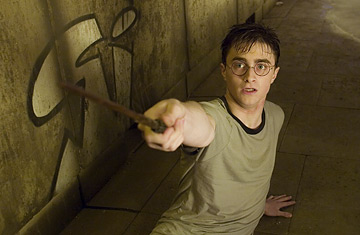
Daniel Radcliffe in Harry Potter and the Order of the Phoenix
Deep into the new movie Harry Potter and the Order of the Phoenix, our teen wizard (Daniel Radcliffe) finds the strength to face down the dark lord Voldemort (Ralph Fiennes) — and the wisdom to pity him. "You can never know love or friendship," Harry tells the noxious, noseless one. "And I feel sorry for you."
A creature of such magnificent maleficence, who rules less by his own considerable powers than by others' fear of him, feeds on cunning and hatred. And that, Harry believes, should make Voldemort hungry for what he lacks: humanity. He is almost chaste in the purity of his evil, innocent of inner virtue. His genius for mischief leaves no room for the emotions and kindnesses that make Harry both more vulnerable and more formidable than the dark lord knows. That goodness, that love, is what lifts Harry above other heroes of young people's literature; that love, and the amazing detail J.K. Rowling has poured into her imaginary universe, are what attracted readers to the Potter oeuvre. It was love at first sight.
First love is a tumbling passion, an addiction to a substance one didn't know existed. Readers encountering the first Harry Potter books felt something like the glorious enthrallment of first love, the swooning immersion in a strange, seductive new world, without the concomitant misery and an impulse to stroll off the nearest bridge. That's one of the perks of the best popular culture; it offers the ecstasy without the depression.
Another perk: Harrymania didn't become epidemic in the U.S. until The Prisoner of Azkaban, the third in J.K. Rowling's seven-book saga, hit the bookstores. So most fans gleefully consumed nearly half of the total opus in one reading orgy — shot themselves into the canon, so to speak — as they learned the lore, were introduced to the wizarding world and became familiar with its rules. Hogwarts was a secret society, a magical fraternity, that the reader heard about in the first book, joined in the second and had moved into by the third.
And though the books were officially in the 9-to-12 children's section (and banned from the New York Times' main best-seller list), Potterphilia was an affliction that touched adults too. I'm no kid, and I have none that I know of, but in August of 1999 I read all three books aloud to my wife, who stayed up way past bedtime to insist on hearing one more chapter.
An ardor this hot can't be sustained forever, or we'd never get past puberty. I suspect that many Hogwartsolepts, while never losing their affection and fascination for the series, bought and read the later books as a happy habit. The period of delirious courtship gave way to a steady marriage between the storyteller and her listeners. As the story progressed, each volume got longer, heavier, with passages that (one realized with a shock) might have been improved with editing. And Rowling produced her epic at a slower pace. After publishing the first four books in early summer of consecutive years, she took three years to finish the fifth, The Order of the Phoenix (which weighed in at an elephantine 896 pages), with the sixth and seventh emerging after that in two-year intervals. The final episode is due to materialize, if you haven't heard, at the stroke of midnight a week from Saturday.